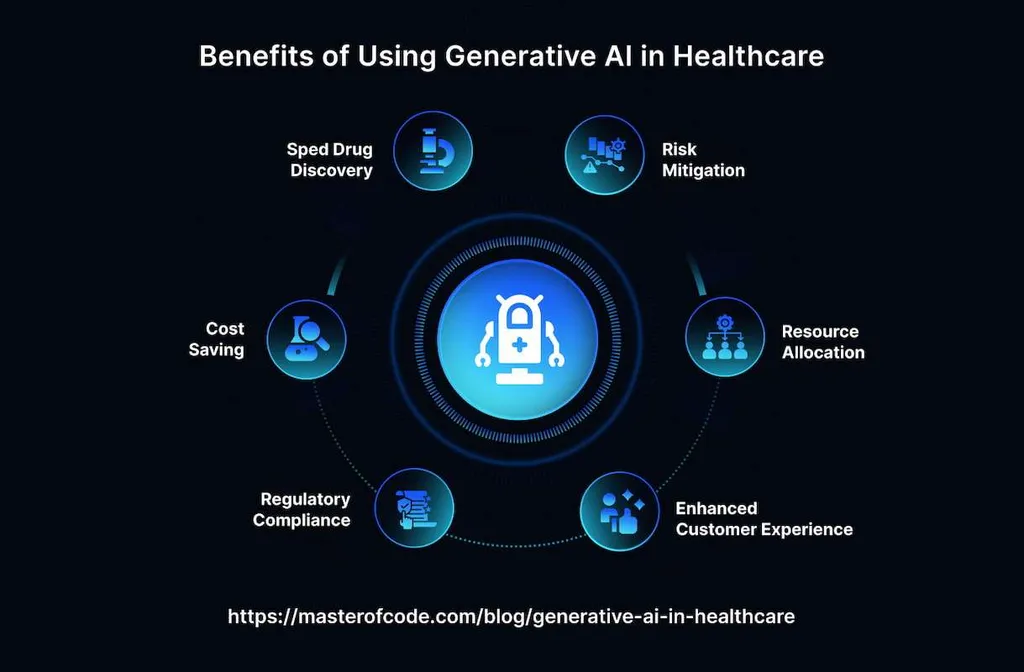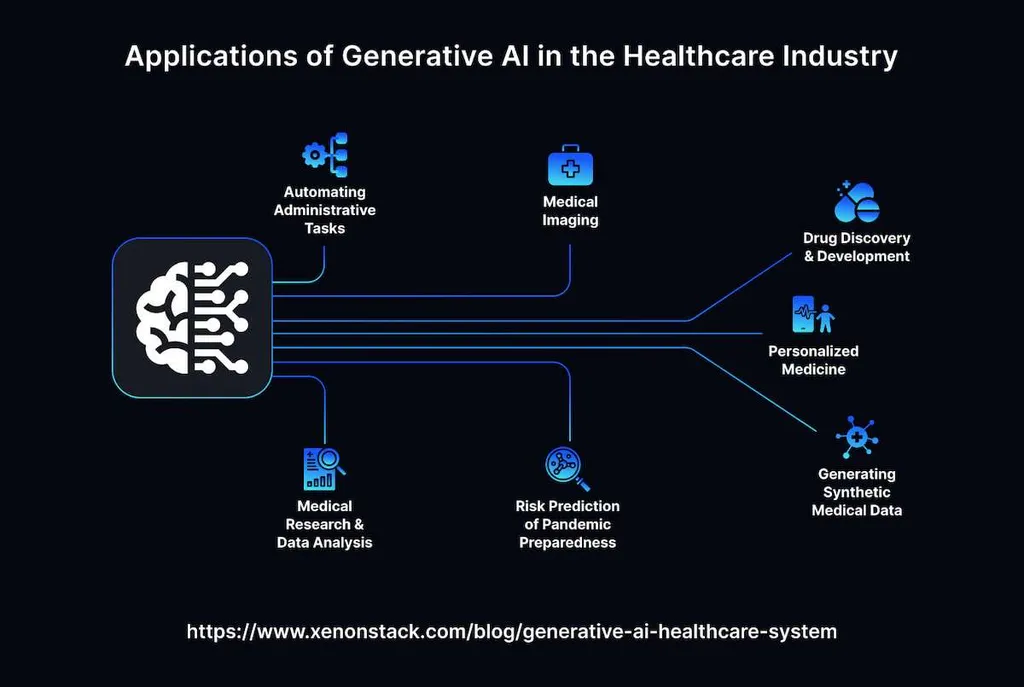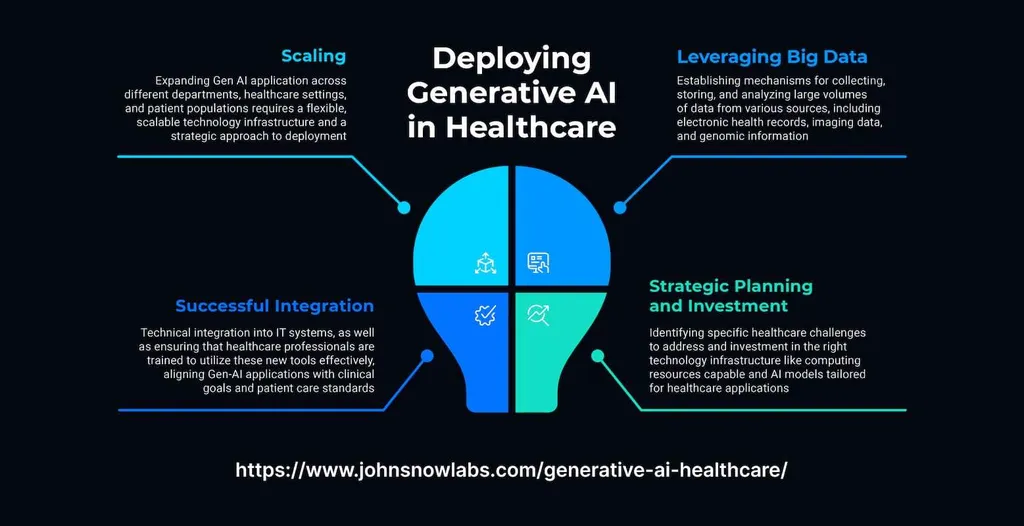AI technology continues to shape various industries, helping companies automate processes, handle large data sets, and optimize workflows. Early adopters were the first to benefit from the deployment of algorithm-based systems, allowing enterprises to enhance the quality of customer service (CS), discover trends, and assist clients along every step of their journeys. In a clinical setting, AI models enable organizations to upgrade the functionality of apps and services, embrace efficient risk management practices, reduce expenses, and streamline internal procedures. In this guide, we will analyze the role of generative AI in healthcare and demonstrate how the power of algorithms can be used to improve patient outcomes.
What is the Role of Generative AI in Healthcare?
Organizations have started to notice the groundbreaking potential of AI across different industries. In the first quarter of 2024, over 70% of respondents from the healthcare services and technology (HST) sector replied that they had already deployed AI solutions or were on the way to implementing them.
Even though stakeholders are still wary of the new technology, they gradually recognize its significance. Besides increasing ROI and optimizing governance practices, AI-powered products have a lot of promising use cases.
According to the recent AI in healthcare statistics, 59% of organizations have already established partnerships with trusted providers who specialize in building custom algorithm-driven tools. MetaDialog builds enterprise-level support platforms that utilize Large Language Models (LLMs) and help companies reduce the average resolution time to 20 seconds. Our experts create advanced tools that automate up to 81% of replies and boost CS team productivity by 5 times.
While 24% of institutions announced plans to build AI solutions using in-staff developers, this option is hardly feasible for ventures with limited budgets. Besides, this approach requires a high level of technical expertise. 17% of entities want to purchase ready-made solutions. As the power of LLMs lies in their ability to learn and improve their performance over time, building a custom product might be the best choice for those who want to protect client’s privacy and provide patients with a personalized experience.
Security concerns slow down the adoption of AI in the industry. A large part of the population still considers such tools unreliable. Building trust necessitates using high-quality data to train LLMs and building powerful products that answer clients’ needs.
Benefits of Generative AI in Healthcare

Industry leaders search for feasible solutions that allow organizations to process and analyze patients’ data without compromising privacy. Devising easy-to-follow strategies is arduous without setting achievable goals. Helping stakeholders to see the undisputed potential of GenAI is the first step toward encouraging broad adoption.
Due to the complexity of the AI system implementation, many healthcare providers utilize third-party services. MetaDialog assists clients with developing advanced AI tools capable of analyzing large data sets, optimizing internal processes, and enhancing client satisfaction by up to 28%.
Organizations opt for AI systems due to the following advantages:
- High ROI: Stakeholders can deploy AI products and measure the impact using easy-to-track metrics, which enables them to see the positive effect of their investments. According to statistical data, 60% of entities that have already implemented AI noticed an increase in ROI.
- Large scope of applications: AI usage is on the rise across different areas. It is expected to improve the productivity of clinical professionals, enhance patient engagement, and streamline administrative processes.
- Efficient drug discovery: AI models are trained to process clinical trial data, analyze scientific sources, and summarize other information. They facilitate discovering the most efficient treatment options, saving clients a lot of money.
- Cost efficiency: Healthcare organizations deploy AI to improve medical equipment maintenance, schedule repairs, and minimize breakdowns. By extending the equipment lifespan, companies reduce downtime and increase profits.
- Compliance: It may be daunting to keep track of recent changes in the laws and adhere to regulations without the assistance of algorithm-based tools capable of managing documentation, handling data, and following established protocols. Using AI services, ventures reduce mistakes and avoid fines.
- Risk alleviation: Using GenAI healthcare solutions, companies identify threats and develop countermeasures to protect patients and inform them of the adverse effects of some drugs on their health. AI tools analyze historical data and develop strategies to prevent issues from happening. It allows organizations to maintain a spotless reputation.
- Resource allocation: After assessing a treatment plan, an AI application analyzes the available resources to discover the best way of using staff, equipment, and facilities to achieve the best outcomes. It enables organizations to avoid unnecessary expenses related to inefficient resource planning.
- Improved client experience (CX): Leveraging the power of AI, patients make appointments with a few clicks and get instant updates about their health. Chatbots integrated with healthcare platforms facilitate scheduling and enable companies to avoid double booking. Patients can also reschedule their appointments if they are unable to visit a doctor at a specific time. 60% of customers who have interacted with AI chatbots developed by MetaDialog do not see any need to escalate their issues to a human CS agent as they consider them resolved.
Despite the obvious upsides to implementing AI solutions, many organizations face difficulties when trying to scale up their operations without the assistance of experienced providers. Hiring a team of developers with strong technical backgrounds is too expensive for small organizations.
Following regulations and tackling common issues associated with AI is the only way to improve patient outcomes and provide top-quality care. However, only large companies have well-developed technical infrastructure and can seamlessly integrate their legacy systems with innovative tools. The limited readiness of healthcare organizations remains a significant roadblock on the way to adoption. Outsourcing this task to an authoritative service provider enables ventures to access the capabilities necessary for successful implementation.
How to Use Generative AI in Healthcare

As many organizations still harbor doubts regarding the applicability of AI in the industry, it becomes paramount to demonstrate the considerable potential of this technology. AI medical solutions enable professionals to collect large volumes of information, prepare accurate reports, streamline diagnostic procedures, provide better treatment solutions, and optimize monitoring processes to improve patients’ long-term outcomes.
- Collecting information: AI chatbots are trained to engage patients in a conversation, analyze their pain points, and summarize the data for healthcare professionals. Using AI, medical staff can quickly extract valuable insights from medical histories. Chatbots are taught to generate relevant questions based on their complaints, prescribed drugs, and the regimes they follow. They can provide recommendations and explain which medications should be discontinued when any changes in a treatment plan are made. Getting a complete overview of a patient’s medical data enables physicians to improve the quality of their services.
- Formulating a diagnosis: AI tools facilitate achieving higher accuracy when diagnosing patients. They are especially efficient when a data set contains a lot of information about a specific condition. While AI solutions have limited applicability to situations when a patient has a rare disease, they demonstrate high effectiveness in recognizing common conditions. Thus, healthcare professionals can focus on complex issues by automating simple processes.
- Developing a treatment plan: Healthcare providers should be cautious when using AI systems. They bear full responsibility for the treatments and must justify their actions. As AI application developers are not liable for malpractice, organizations should develop clear guidelines before implementing AI. When creating personalized treatment plans, professionals may utilize AL to expedite low-risk processes.
- Monitoring: Ensuring patient adherence to post-treatment guidelines is challenging unless providers utilize wearable devices to assist clients on the way to full recovery. Specialists should clarify that non-adherence limits the treatment’s effectiveness and recommend technology solutions to help patients improve their health. AI tools facilitate tracking behavior patterns outside clinical settings, but providers should get consent to use them.
AI solutions facilitate population health management, allowing medical providers to analyze huge data sets containing information from health records. Using predictive analytics tools available in AI systems, it becomes possible to identify risk groups, estimate the likelihood of readmissions, and personalize care plans.
Main Steps to Deploy Generative AI Systems in Healthcare

Deploying AI solutions requires building a strategy and setting achievable objectives. It should be possible to assess progress using performance metrics. Reaching the desired outcomes requires understanding the challenges an enterprise may face on the way to AI implementation.
Making AI an integral part of a company’s workflow requires assessing the capabilities of the existing infrastructure, building solutions, and collecting data to improve the functioning of AI models.
Healthcare leaders should follow such steps:
- Analyze the environment: Discovering the best way to use technology and selecting the most relevant applications enables executives to understand the value AI tools could produce and create a clear road map.
- Gather the data: AI tools can be deployed to analyze an electronic health record (EHR) collection or other similar data sets. They help providers devise more efficient treatment approaches.
- Assess tech stack and infrastructure: A venture should have a team of seasoned developers knowledgeable about AI technology. Enhancing their capabilities may be necessary for them to deploy LLMs at scale. As investing in research and development may not be a feasible option for small organizations, entrusting third-party providers with AI model implementation and training may be a cost-saving alternative.
- Assess risks: Protecting patient privacy and ensuring that data sets do not contain biased information is crucial to maintaining the high efficiency of AI tools. MetaDialog’s chatbots provide customers with accurate information that is relevant to their needs. Adding humans to the loop enables ventures to control the deployment of AI-powered systems and detect inconsistencies.
AI solutions should aid professionals instead of replacing them. Avoiding errors and expediting AI implementation may require educating employees to ensure their skills are up to the task. Preventing burnout necessitates teaching frontline staff how to reduce their workload and provide better care by leveraging AI.
While large organizations have enough resources to build AI products, smaller companies could benefit from establishing partnerships with technology service providers.
Tips and Recommendations
Implementing generative AI in healthcare requires organizations to develop clear policies to ensure full transparency. Medical professionals work together with app developers to minimize the possibility of errors, detect data input issues, and eliminate biases.
Companies follow these steps to avoid issues when integrating AI systems:
- Obtain informed consent: Patients must be fully aware of the usage of AI. During every step of their journey, they should give their permission for a healthcare professional to use AI-powered tools.
- Educate patients: They should understand that their data may be used to improve the accuracy of AI models. Advanced systems facilitate gathering data from wearable devices. However, if an organization wants to utilize this information, it should let patients know what practices it uses. Customers should be educated on the steps an institution takes to safeguard their data and learn how AI solutions can help them save money and achieve improved outcomes.
- Utilize health information exchanges (HIE): It may be impossible for small organizations to compete with large healthcare providers unless they find a way to access huge volumes of accurate data. Providing top-quality care to underprivileged communities requires using HIEs. Such platforms democratize access to vital medical data. They function as aggregators collecting data from different providers. It allows companies of all sizes to deploy and improve AI systems using information contained in large collections of medical records.
Using these practices, organizations ensure successful AI implementation and contribute to building an industry where every participant has equal opportunities.
Final Thoughts
Organizations that want to integrate AI for healthcare into processes successfully should carefully consider the expected outcomes and assess possible risks. Top managers analyze each use case carefully and weigh the possible benefits against the issues they have to deal with. MetaDialog develops fully compliant AI solutions that can be deployed on the premises or in the cloud. Such systems ensure patient privacy, enable medical professionals to spend less time developing efficient treatment strategies, and analyze historical data to expedite drug discovery.
The usage of generative AI in healthcare is destined to become more widespread. As AI technology is still in development, it may be challenging to implement such solutions without the assistance of reputable service providers. Companies that want to minimize risks should select a reputable partner to navigate through the intricacies of AI implementation. Working with seasoned professionals from MetaDialog’s team allows organizations to build solutions tailored to their needs. Book our free trial today and discover how to utilize AI products to enhance the quality of patient care without compromising on safety.
